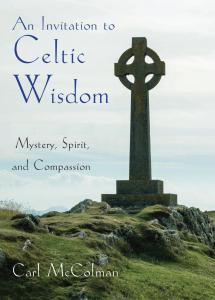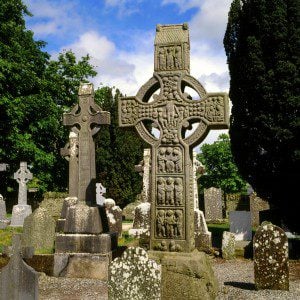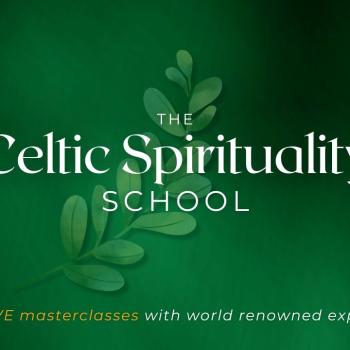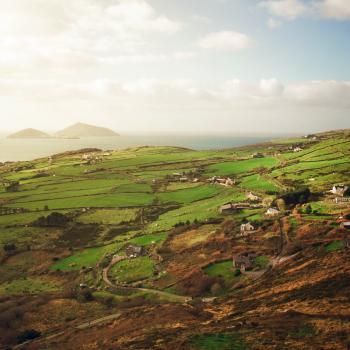 I’ve been pondering the question, “What are the disctinctive qualities of Celtic Christianity?” In thinking about this, five particular points emerged. Celtic Christianity, as expressed in the poetry, prayers, folklore and hagiography of the earliest Christians of Ireland, Scotland and Wales, appears to have these five distinctive qualities:
I’ve been pondering the question, “What are the disctinctive qualities of Celtic Christianity?” In thinking about this, five particular points emerged. Celtic Christianity, as expressed in the poetry, prayers, folklore and hagiography of the earliest Christians of Ireland, Scotland and Wales, appears to have these five distinctive qualities:
- Hospitality, and particularly hospitality to all wisdom. This is epitomized by the early Celtic Christian tolerance/acceptance of the Celtic pagan past, at a time when most of Christendom was aggressively attacking all outsider religion as demonic. “Christ is my Arch-Druid,” said Columcille, implying not onlly his love for Christ, but that in Christ he could also honor the faith of his pre-Christian ancestors. I would think that today this hospitality manifests as a deep ecumenism and also as an openness to all that is beautiful good and true in non-Christian faiths, such as Vedanta or Zen. In general, the virtue of hospitality suggests that the heart of Celtic Christianity is an ethic of welcoming rather than purity.
- Deep love and respect for the earth. This is so obviously part of the heart of the Celtic tradition that it really needs no commentary. But from the folklore associated with saints like Kevin and Brigid, to the lorica attributed to Patrick, to the overall spirit of joy in nature found in early Celtic Christian poetry, this is a constant theme of Celtic wisdom, and one vitally relevant to our day. I don’t remember the exact quote, but Columcille once said something to the effect that the most fearful sound he could think of was that of an ax cutting down a tree. There is the Celtic heart.
- Honoring of women’s ministry. The archetype here is Brigid, the abbess who according to legend was consecrated a bishop and provided spiritual guidance to both women and me. In general, the role of women in early Irish law was much stronger and egalitarian than its Roman counterpart. I don’t want to overstate the case or suggest that Ireland was some sort of proto-feminist paradise, but I do think the relative standing of Celtic women when compared to women in general in the early centuries of Christianity can be an inspiration to all Christians who seek a more equitable theology of the sexes. The Celts remind us that we do not have to be limited by the heritage of the Roman Empire when it comes to understanding the role of women in the life of the church.
- Emphasis on the local. “To travel to Rome: great expense; little profit; but to pilgrimage to Glendalough: little expense, great profit.” Maybe this was just a marketing campaign launched by the good monks of Glendalough, but I think it speaks to a larger sensibility among the Irish (and other Celtic) Christians and general. Think of Holy Wells — each one is unique and different and distinctive. In the Celtic world, the local is just as important as the universal. Celtic Christianity balances universality with honoring of what is distinctive and unique about the locality. Closely aligned with this is the Celtic preference for monasteries rather than dioceses. The word “Tuath” suggests not only a community, but the land where that community lives. I think this goes a long way to explaining the Celtic spirit.
- Deep creativity. From the splendid illuminated calligraphy of the Book of Kells; to the intricate metalwork of the Ardagh Chalice; to the finely-crafted carving that characterizes the Crosses of Monasterboice: Celtic Christianity literally oozes with art and creativity. It’s a highly expressive tradition, full of poetry and folklore and local legends, and even “medieval bestsellers” like The Voyage of Brendan, rich with imaginative storytelling. This I would think is closely aligned with the love of the earth: to celebrate God’s creation is linked with celebrating our own creativity (and using it to honor and praise the Ultimate Artist).
I’m sure I could come up with more, but this seems to be a good place to stop for now.
Celtic Christians never thought of themselves as somehow different or special. But by simply being themselves, they have bestowed upon us, their spiritual descendants, a priceless and precious gift: a unique way of looking at the world, and therefore, a distinctive cultural expression of discipleship that is deeply relevant to the needs of the postmodern world.
To learn more about Celtic spirituality, check out An Invitation to Celtic Wisdom: Mystery, Spirit and Compassion (Hampton Roads, 2018).
Enjoy reading this blog?
Click here to become a patron.













